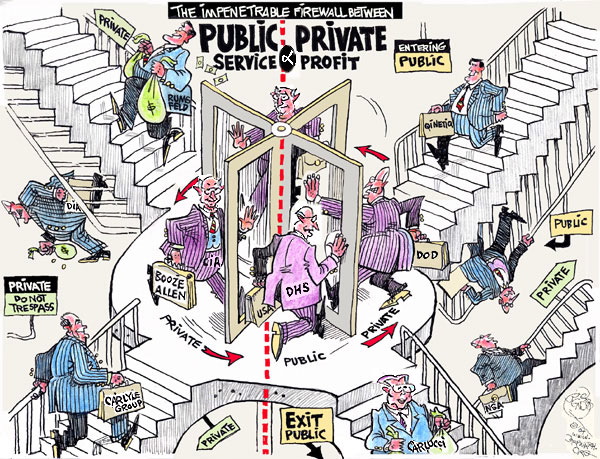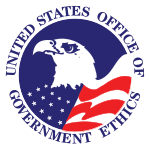Government ethics may seem like an oxymoron. Certainly today, its meaning is grossly misinterpreted. When President Eisenhower left office, he warned of a looming military-industrial complex and how we must avoid it. Little did Eisenhower know what an underestimate this statement would become in the future. Surely, today, we have a military-industrial complex, but even more we have a government-industrial complex.
I doubt there are any official figures on how many members of the bureaucracy are former industrialists and how many industrialists are former bureaucrats. However, anyone who works inside the beltway knows how prevalent this is in our system. There are only two reasons people take the underpaid, overworked positions: eventually they want the highly paid, elected position OR they want the highly paid industrial jobs as a consultant or lobbyist. The reason that this second class of positions exists is that people work in government just long enough to meet the right people, the right connections, and earn the process so that they can leave for the greener pastures of the private sector.
This begs the question again: for whom do you work, Mr. Corporate Climber, when you are taking a government check? Are you working for the American people or for yourself?
The Government, so concerned about the problem, created an entire Executive Agency to address it. The mission of the U.S. Office of Government Ethics (OGE) is to foster high ethical standards for executive branch employees and strengthen the public’s confidence that the Government’s business is conducted with impartiality and integrity. The OGE was established by the Ethics in Government Act of 1978, It was part of the new Congresses accountability platform following the resignation of Richard Nixon. It is the agency that provides overall direction, oversight, and accountability of Executive Branch policies designed to prevent and resolve conflicts of interest. OGE is also charged with promoting high ethical standards for Executive Branch employees.
While OGE sets policy for the executive branch ethics program, the head of each agency has primary responsibility for the ethics program in that agency. To support the day-to-day activities of the ethics program, each agency head selects an individual to serve as the agency's designated agency ethics official. That's right, although the OGE sets the policies, it is left to the agencies to self-police, with the guidance of the OGE of course.
The OGE created the The Standards of Conduct in 1993. The Standard covers issues such as gifts, conflicting financial interests, impartiality, seeking employment, misuse of position, and outside activities. They are designed to address not only actual conflicts of interest but also activities that give rise to the appearance of such conflicts.
In addition,the financial disclosure program is designed to help agencies spot and prevent conflicts of interest before they occur and to promote confidence in the integrity of Government decision-making. Through regulation, OGE establishes the procedures for administering the executive branch financial disclosure system. In addition, OGE has an important role in certifying the financial disclosure reports for all Presidential appointees confirmed by the Senate and the most senior White House staff members. Finally, through monitoring and oversight, OGE ensures that agencies implement effective financial disclosure processes.
The OGE has no role in the ethics programs of the legislative or judicial branches of the federal government. Similarly, OGE has no jurisdiction over state or local government ethics programs. OGE does not conduct investigations and cannot represent citizens in legal matters.
In the 34 years since the formation of OGE, none of the 5,700 employees working in the 133 executive agencies has found any wrongdoing to be significant enough to trigger enforcement of ethical standards.
What about Congress? How are they policed ethically? Self-policing of course! The Senate Select Committee on Ethics handles ethical reporting on Senators. The Senate sets the rules and the committee "enforces" them. What about the House? Well for the House of Representatives, there is some oversight. The House Committee on Ethics does establish rules conduct of Representatives. But in addition, there is the Office of Congressional Ethics (OCE). The Office of Congressional Ethics (OCE) was created in March of 2008 as an independent, non-partisan office governed by a Board comprised of private citizens. The OCE reviews allegations of misconduct against Members, officers, and staff of the House and, when appropriate, refers matters to the House Committee on Ethics. The OCE is not authorized to determine if a violation occurred. The OCE is also not authorized to sanction Members, officers, or employees of the House or to recommend any sanctions. The OCE is not able to provide advice or education on the rules and standards of conduct applicable to Members, officers, and employees of the House. A pretty powerful group huh?
The US has hundreds of laws and statutes dealing with ethics and more than 5,000 federal employees at more than 130 federal agencies charged with interpreting them.
The authority of Congress to discipline its members is found in the Constitution, which states, "Each House determine the Rules of its proceedings, punish its Members for disorderly Behaviour, and, with the Concurrence of two thirds, expel a Member."
By 2004, the House had heard 150 cases of members accused of crimes. 12 of those members were convicted, but not expelled. Although the House is forgiving of its own failings, it has impeached 12 federal judges and two executives.
Finally, there are the lobbyists. Last year, they numbered over 12,000. That's about 20 for every member of Congress. Those are the registered lobbyists. Not all lobbyists register. The rules that control lobbying, totaling a massive 19 pages of statute, can be found here. When it comes to lobbyists, its basically the wild west.
So what do we do? This is a new problem, relatively. It arose most strikingly through a classic conservative plan: deregulation. It was sold as taking the government off the backs of industry. The public was told that industry is basically good and that, through market forces, it could regulate itself. Instead, deregulation brought about the boom in corporate power for which we can thank our current destructive situation. Obviously, with industry regulating itself, the dollar was more important than protections.
Since the source is so clearly identified, the solution is as well. As part of a greater effort I will outline later, deregulation needs to be rolled back and reregulation needs to occur. Further, although there has never been regulation on lobbyists, there needs to be a licensing, registration, and identification system for them. Additionally, there needs to be more, or any, government oversight of the entire lobbying industry.
As part of this effort, there need to be limits on transfers between the public and private sectors. Everyone has a plan for doing this: here is my suggestion. Any person at cabinet-support level or above, appointed position, or elected official; are barred from consulting and direct lobbying in any private position that requires advocacy or the expenditure of funds. This bar is in effect for two years from when the person left the public or elected job. For any lower level official, there should be a bar of one year for a move from any position in the bureaucracy to an advocacy or consulting job in the private sector. I’ll address more of this when I talk about cutting red tape, but as a basic outline, I think this is a start. Taking these steps can help bring some measure of ethics to the government process and cut into the billions of dollars trading hands under the current system of questionable ethics.
So what do we do? This is a new problem, relatively. It arose most strikingly through a classic conservative plan: deregulation. It was sold as taking the government off the backs of industry. The public was told that industry is basically good and that, through market forces, it could regulate itself. Instead, deregulation brought about the boom in corporate power for which we can thank our current destructive situation. Obviously, with industry regulating itself, the dollar was more important than protections.
Since the source is so clearly identified, the solution is as well. As part of a greater effort I will outline later, deregulation needs to be rolled back and reregulation needs to occur. Further, although there has never been regulation on lobbyists, there needs to be a licensing, registration, and identification system for them. Additionally, there needs to be more, or any, government oversight of the entire lobbying industry.
As part of this effort, there need to be limits on transfers between the public and private sectors. Everyone has a plan for doing this: here is my suggestion. Any person at cabinet-support level or above, appointed position, or elected official; are barred from consulting and direct lobbying in any private position that requires advocacy or the expenditure of funds. This bar is in effect for two years from when the person left the public or elected job. For any lower level official, there should be a bar of one year for a move from any position in the bureaucracy to an advocacy or consulting job in the private sector. I’ll address more of this when I talk about cutting red tape, but as a basic outline, I think this is a start. Taking these steps can help bring some measure of ethics to the government process and cut into the billions of dollars trading hands under the current system of questionable ethics.
© Robert Cheek, 2011, 2013




No comments:
Post a Comment